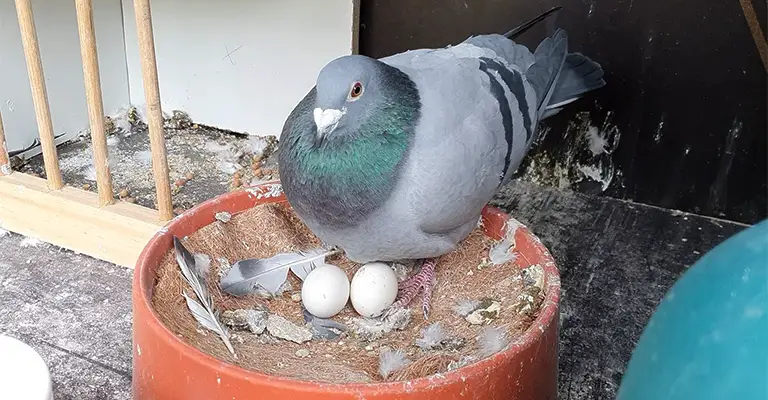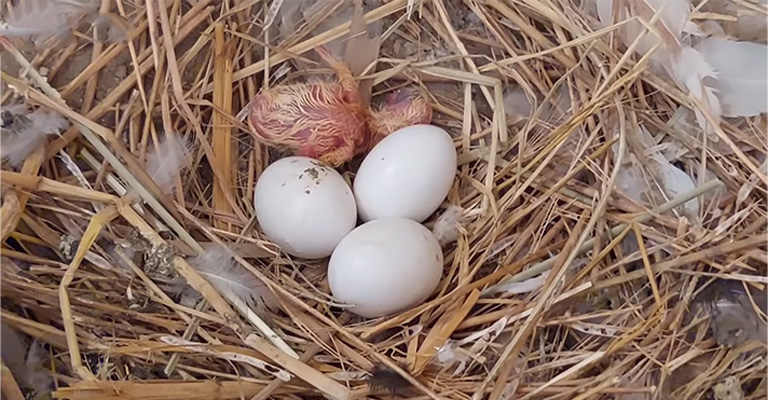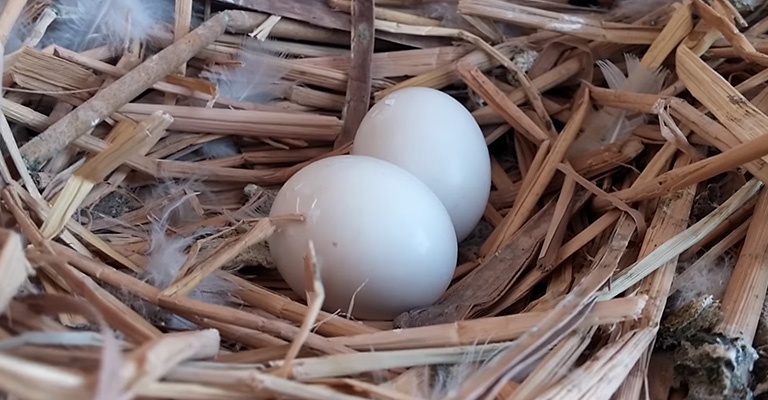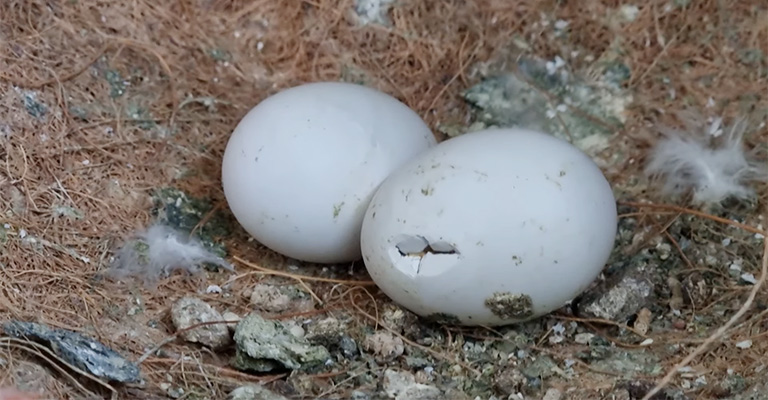The lifespan of a pigeon egg in the absence of incubation is a fascinating aspect of avian reproduction that underscores the delicate balance between nature’s mechanisms and environmental factors.
Pigeon eggs, like those of various bird species, possess inherent adaptations that enable them to endure for a limited duration without the nurturing warmth of incubation.
Understanding how long does a pigeon egg survive unincubated sheds light on the intricate interplay between biology and external conditions, offering insights into the challenges these embryos face during their crucial developmental phase.
This inquiry delves into the temporal confines within which an unincubated pigeon egg can sustain its viability, considering factors such as temperature sensitivity, developmental arrest, vulnerability to predators, and the risk of dehydration.
By exploring these dynamics, we gain a deeper appreciation for the mechanisms that govern avian reproduction.

How Long Does A Pigeon Egg Survive Unincubated?
Pigeon eggs, like those of many other bird species, have a limited survival time when left unincubated.
The viability of an unincubated pigeon egg depends on several factors, such as environmental conditions, temperature, humidity, and the specific stage of development the egg has reached.
Initial Viability
Freshly laid pigeon eggs can remain viable for a brief period without incubation, typically ranging from a few days to a week.
During this time, the eggs are equipped with natural protective mechanisms, such as a porous shell that allows for gas exchange and a protective cuticle that helps prevent bacterial contamination.
However, without the warmth of incubation, the embryo’s development is halted.
Chilling Sensitivity
Pigeon eggs are sensitive to temperature fluctuations, especially in colder environments. Exposure to low temperatures for extended periods can reduce their viability.
The developing embryo requires a consistent and optimal temperature for proper growth. If the egg becomes chilled, the embryo’s metabolism slows down, and its chances of survival decrease.
Limited Development

During the unincubated period, the embryo’s development remains paused. It does not progress beyond a certain point, and the embryo remains in a state of suspended animation.
If incubation resumes after a prolonged period of dormancy, the embryo might not be able to continue its development, and the egg might not hatch successfully.
Humidity and Dehydration
Eggs also lose moisture gradually when left unincubated. The protective cuticle on the shell helps prevent excessive moisture loss, but over time, the egg’s internal moisture decreases.
Dehydration can be detrimental to the developing embryo, as it relies on the egg’s moisture for survival and proper growth.
Vulnerability to Predators and Pathogens
Unattended eggs are susceptible to predation by other animals or birds, which could break the eggshell or consume its contents.
Additionally, eggs left in uncontrolled environments are more likely to be exposed to harmful pathogens and bacteria that can penetrate the shell and damage the developing embryo.
The viability of an unincubated pigeon egg is relatively short, usually limited to a few days to a week.
The embryo’s development halts, and the egg becomes increasingly vulnerable to environmental conditions, temperature fluctuations, dehydration, predation, and microbial contamination.
To ensure the successful hatching of pigeon eggs, proper incubation within the appropriate temperature and humidity range is crucial.
Factors Affecting The Survival Of Pigeon Eggs Without Incubation

Here are the factors that can affect the survival of pigeon eggs without incubation, along with a paragraph description for each point:
Temperature
Pigeon eggs need a constant temperature of 99-102 degrees Fahrenheit (37-39 degrees Celsius) for optimal development.
If the temperature drops too low or rises too high, the embryos may die or develop abnormalities. Therefore, it is important to keep the eggs in a warm and stable environment, such as an incubator or under a heat lamp.
Humidity
Pigeon eggs also need a certain level of humidity to prevent dehydration or mold growth. The ideal humidity range is 50-65%. If the humidity is too low, the eggs may dry out and become unviable.
If the humidity is too high, the eggs may become moldy or rot. To maintain the proper humidity, the eggs should be placed on a moist substrate, such as vermiculite or peat moss, and sprayed with water occasionally.
Disturbances
Pigeon eggs are sensitive to external disturbances, such as vibrations, shocks, or too much handling. These can damage the eggs and reduce their chances of survival.
Therefore, it is important to handle the eggs with care and avoid moving them around too much.
The eggs should be turned gently once or twice a day to prevent the embryos from sticking to the shell and to distribute the heat evenly.
Parental Health
The condition and health of the parent pigeons can also affect the survival of their eggs without incubation.
If the parents are stressed or sick, they may not be able to provide enough warmth and care for their eggs. They may also pass on infections or diseases to their offspring through their eggs.
To ensure the health of the parent pigeons, they should be fed a balanced diet, given fresh water, and kept in a clean and comfortable cage.
Genetics
The genetic makeup of the pigeon eggs can also influence their ability to survive without incubation. Some breeds of pigeons may have more resistance to temperature or humidity fluctuations than others.
Some may also have faster or slower development rates than others. These factors can affect how long the eggs can stay viable without incubation.
To improve the genetic quality of the pigeon eggs, selective breeding or cross-breeding can be used.
Methods Of Hatching Pigeon Eggs Without An Incubator

Hatching pigeon eggs without an incubator can be challenging but not impossible. There are some methods that can help you hatch your pigeon eggs artificially, using household items or other birds.
Here are the methods that you can try, along with a paragraph description for each point:
The Warm Water Trick
This method involves wrapping the eggs in a damp towel and placing them in a warm ceramic bowl under a heat lamp.
The warm water trick is a way to encourage eggs that are overdue to hatch, as it provides heat and humidity for the embryos.
You need to keep the temperature between 37.2°C to 37.5°C and rotate the towel every 6-8 hours to prevent the embryos from sticking to the shell.
The Heat Lamp Method
This method is similar to the warm water trick but without the water and towel. You simply place the eggs in a ceramic bowl and put them under a heat lamp, making sure to turn them every 6-8 hours.
The heat lamp method can also work for hatching bird eggs, but you need to be careful not to overheat or dry out the eggs. You also need to monitor the humidity level and spray some water on the eggs occasionally.
The Broody Hen Method
This method involves finding a broody hen that is willing to sit on your pigeon eggs and hatch them for you.
A broody hen is a hen that has a strong maternal instinct and wants to incubate eggs, even if they are not her own. The broody hen method can be very effective, as the hen will provide natural heat, humidity, and protection for the eggs.
However, you need to make sure that the hen is compatible with your pigeon eggs and that she will not harm them or reject them after they hatch.
The Electric Blanket Method
This method involves wrapping the eggs in a cloth and placing them on an electric blanket, setting it to low or medium heat.
The electric blanket method can provide a steady and gentle heat source for the eggs, but you need to be careful not to burn them or cause a fire hazard.
You also need to turn the eggs every 6-8 hours and check the temperature and humidity regularly.
The Hot Water Bottle Method
This method involves filling a hot water bottle with warm water and placing it in a box or basket with some bedding material, such as straw or hay.
Then, you place the eggs on top of the bedding material and cover them with another layer of bedding material.
The hot water bottle method can keep the eggs warm and cozy, but you need to change the water every 12 hours and turn the eggs every 6-8 hours. You also need to monitor the temperature and humidity carefully.
FAQ
Pigeon eggs can remain viable for a short period, typically ranging from a few days to around a week, without incubation. After this period, their chances of successful hatching significantly decrease.
Factors such as temperature fluctuations, humidity levels, exposure to predators, and the developmental stage of the embryo affect the survival of unincubated pigeon eggs.
While an egg’s development pauses when unincubated, if it becomes chilled for an extended period, the embryo’s chances of survival decrease, and resuming development might not be possible.
Unincubated pigeon eggs gradually lose moisture, leading to dehydration. This dehydration can negatively affect the embryo’s growth and viability, as it relies on the egg’s moisture for survival.
Unincubated pigeon eggs possess natural defenses, such as a porous shell and protective cuticle, which help maintain viability for a limited time by allowing gas exchange and reducing the risk of bacterial contamination.
Conclusion
In the realm of avian reproduction, the survival span of unincubated pigeon eggs serves as a testament to the delicate equilibrium between biological adaptability and environmental demands.
These eggs exhibit a limited ability to withstand external challenges, suspended in a state of potentiality as they await the nurturing embrace of incubation.
While the natural defenses of porous shells and protective cuticles safeguard against immediate threats, the passage of time and exposure to uncontrolled conditions inevitably diminish the chances of successful hatching.
The brief lifespan of unincubated pigeon eggs underscores the remarkable synchronization between nature’s design and the nurturing role played by parental incubation. In unraveling the temporal dimensions of egg viability, we unravel the intricacies of life’s earliest stages and gain insight into the myriad forces shaping avian survival strategies.